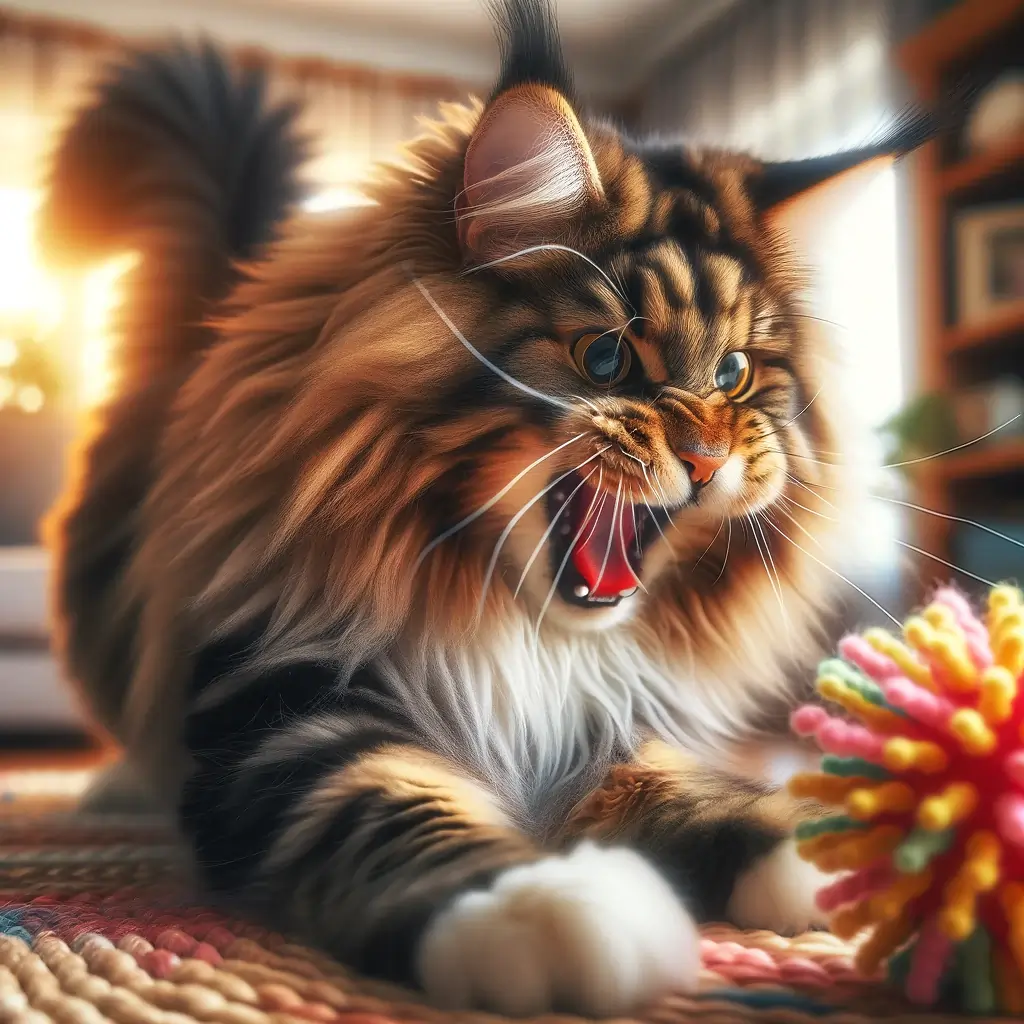In this section, we will explore the nature of Maine Coon cats and address the question of whether they are aggressive. We will discuss the causes of aggression in Maine Coons, the traits that may lead to aggressive behavior and potential solutions for managing aggression.
The Nature of Maine Coon Cats
Maine Coon cats are a popular breed known for their friendly and sociable nature. These intelligent cats form strong bonds with their human companions and enjoy being part of the family. Maine Coons are not aggressive by nature and are typically friendly and outgoing with both adults and children. Their sociability makes them an excellent choice for households with multiple pets or young children.
While Maine Coons are generally gentle and friendly, it’s important to remember that any cat, regardless of breed, can display aggressive behavior in certain situations. Aggression in cats is often a response to fear, stress, or a perceived threat to their territory. It’s essential to understand the factors that can trigger aggression in Maine Coons and take appropriate measures to prevent and manage it.
“Maine Coon cats are a wonderful breed known for their friendly and sociable nature. They are highly intelligent and easily adapt to different environments. It is important to remember that even the friendliest Maine Coon can display aggression if they feel threatened or stressed. Proper socialization and a nurturing environment are key to ensuring a well-behaved and happy Maine Coon cat.”
Maintaining a Harmonious Environment
To ensure a harmonious environment for your Maine Coon cat, consider the following:
- Provide ample opportunities for exercise and mental stimulation.
- Establish a consistent routine to minimize stress.
- Create a safe and secure space free from potential triggering factors.
By understanding the nature of Maine Coon cats and addressing their specific needs, cat owners can foster a loving and peaceful relationship with their feline companions.
| Traits of Maine Coon Cats | Aggression Potential |
|---|---|
| Sociable and friendly | Low |
| Intelligent | Low |
| Adaptable | Low |
Understanding Maine Coon Aggression
Aggression in Maine Coon cats can stem from various factors. Hormonal issues, territorial instincts, lack of proper socialization, and exposure to loud noises are some common reasons why Maine Coons may exhibit aggressive behavior. It is important for cat owners to understand these factors to effectively manage and prevent aggression in their Maine Coon cats.
One of the reasons why Maine Coon cats may display aggression is due to hormonal influences. Unneutered male cats, in particular, can show aggressive behavior as a result of their natural breeding instincts. Neutering or spaying your Maine Coon cat can help reduce aggression related to hormones.
Territorial instincts can also contribute to aggressive behavior in Maine Coon cats. These cats can become possessive of their space and may exhibit aggression towards other cats or even humans who encroach upon their territory.
Lack of proper socialization is another factor that can lead to aggression in Maine Coons. If a Maine Coon kitten has not been adequately exposed to different environments, people, and animals during their early developmental stages, they may have difficulty adjusting and can exhibit aggression later in life.
Exposure to loud noises can also trigger aggression in Maine Coon cats. These cats have sensitive hearing, and sudden loud noises can startle them, causing them to react aggressively.
By understanding the reasons behind Maine Coon aggression, cat owners can take steps to manage and prevent aggressive behavior in their pets. Neutering or spaying, providing proper socialization, creating a secure and comfortable environment, and avoiding exposure to loud noises can all contribute to reducing aggression in Maine Coon cats.
For more information on managing Maine Coon aggression, continue reading to the next section.
Managing Maine Coon Aggression
When dealing with an aggressive cat, cat owners need to understand the underlying causes of the behavior. By identifying and addressing these issues, it’s possible to redirect the cat’s behavior and effectively manage aggression. In the case of Maine Coon cats, several strategies can be employed.
Neutering or Spaying the Cat
One common cause of aggression in cats is hormonal factors. By neutering or spaying your Maine Coon cat, you can help reduce aggressive behavior caused by these hormones. This procedure can regulate their hormones and promote a calmer and less aggressive demeanor.
Addressing Underlying Health Problems
Aggression in cats can also be a symptom of underlying health problems. For Maine Coon cats, breed-specific issues such as hip dysplasia can contribute to aggressive behavior. It’s important to consult with a veterinarian to identify and address any underlying health issues that may be contributing to your cat’s aggression.
Behavior Problems and Training
Some Maine Coon cats may have behavior problems that contribute to their aggression. By implementing effective training techniques and using positive reinforcement, you can redirect your cat’s behavior and encourage more appropriate responses. This may involve rewarding good behavior, providing mental stimulation, and discouraging aggressive actions.
Overall, managing Maine Coon aggression requires a multifaceted approach that considers the cat’s physical and behavioral well-being. By neutering or spaying your cat, addressing any underlying health problems, and employing training techniques, you can help redirect their behavior and create a more harmonious environment for both your cat and yourself.

Maine Coon Aggression Towards Other Cats and Humans
Maine Coon cats are generally not aggressive towards other cats or humans. These gentle giants of the feline world are known for their friendly and sociable nature. However, certain factors may trigger aggressive behavior in individual Maine Coon cats, such as feeling threatened or improper socialization with other cats.
Instances of aggression towards humans are extremely rare and should not be a cause for concern. Maine Coons typically have a docile temperament and are unlikely to pose any harm to humans. They are considered one of the most gentle and loving cat breeds.
“Maine Coons are generally mild-mannered and great with other animals and children.”
Proper Socialization is Key
One of the critical factors in preventing aggression towards other cats or humans is proper socialization. By exposing Maine Coon kittens to various situations, people, and animals at a young age, owners can help them develop positive behaviors and reduce the likelihood of aggression later in life.
Can a Maine Coon Kill a Human?
Despite their large size and impressive appearance, Maine Coons pose no threat of killing humans. Their gentle temperament and lack of aggressive tendencies make them an excellent choice for families and individuals seeking a companion cat.
| Type of Aggression | Maine Coon Behavior |
|---|---|
| Aggressive towards other cats | May display aggression if they feel threatened or improperly socialized |
| Aggressive towards humans | Extremely rare; Maine Coons are generally docile and friendly towards humans |
Conclusion
Overall, it’s important to understand that Maine Coon cats are not inherently aggressive. While they can display aggressive behavior, it is usually due to various factors that can be managed and addressed. By identifying the causes of aggression in Maine Coons and implementing appropriate techniques, cat owners can create a safe and harmonious environment for their furry friends.
If you notice signs of aggression towards other cats or humans, it’s crucial to take action to prevent any potential harm. Proper socialization, training, and positive reinforcement can help minimize aggressive behavior. Seeking professional advice from a veterinarian or animal behaviorist is also recommended if aggression issues persist or escalate.
Maine Coons are highly sociable and friendly cats, making them great companions for families. With proper care and attention, they can adapt well to their environment. If you’re considering adopting a Maine Coon, it’s essential to understand the responsibilities that come with owning this breed. Providing them with a loving home, regular veterinary care, and a stimulating environment can help prevent aggression and ensure their overall well-being.
FAQs
Q: What are Maine Coons known for in terms of aggression?
A: Maine Coons are not generally known for being aggressive. They are typically friendly and social cats.
Q: Are Maine Coons more prone to aggression compared to other cat breeds?
A: No, Maine Coons are not naturally aggressive. They are one of the largest domesticated cat breeds and are generally known for their friendly nature.
Q: What are the signs of aggression in a Maine Coon?
A: Signs of aggression in a Maine Coon may include hissing, swatting, growling, or puffing up their fur.
Q: How can I help my Maine Coon if it starts to become aggressive?
A: If your Maine Coon starts to show signs of aggression, try to provide them with more playtime, a cat tree for climbing, and a calm environment to help reduce stress.
Q: Why might a Maine Coon become aggressive?
A: Maine Coons can become aggressive due to stress, fear, illness, or feeling threatened. It’s important to understand the underlying cause to address the behavior.
Q: Can Maine Coons get along with other cats?
A: Maine Coons can get along well with other cats if properly introduced and given time to acclimate to each other’s presence.
Q: Are there solutions for dealing with Maine Coon aggression?
A: Yes, there are ways to help your Maine Coon overcome aggression, such as providing enrichment, positive reinforcement, and seeking advice from a professional if needed.

Hey guys, My name is Simon Smith. I’m from Canada and live near Victoria
I live with my sweet family and have 20+ Ragdolls of different types. I love them as my children. My profession is as a hotel manager.
I love to keep Ragdolls and grow their breeder case. I have 7 years of experience.
I’m an expert in cat care. So, I’m here to provide you with new information about my cats daily. This is my blog website, so I request that you kindly visit our site daily.
If you’re a Ragdolls lover and you have any questions or confusion about cats, text me on the Contact Us page or Gmail.
Thank u
